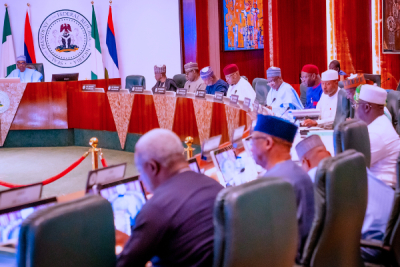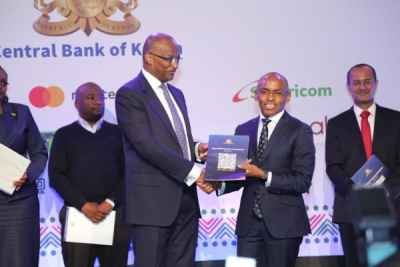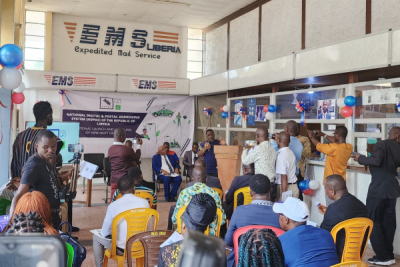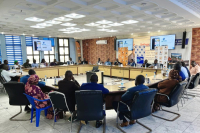
Public Management (483)
Tunisia announced the arrival of 5G technology in 2020, and investments have since been made to prepare for its deployment. The introduction of this advanced technology is anticipated to enhance trade and services in the country.
Tunisia is poised to proceed to the commercial launch of the 5G in 2024. The roadmap for its implementation is being developed and will be announced in the coming weeks. This was revealed by Nizar Ben Neji (photo), the Tunisian Minister of Communication Technologies, on Monday, May 8 at the ICT Summit 2023 organized by Huawei Tunisia.
"Pilot tests have been conducted with telecommunications operators. The technology will be gradually deployed dependent on the needs of various users, including businesses and administrations, "said Nizar Ben Neji.
Over the past three years, telecommunications operators have invested heavily in upgrading their networks to prepare for the deployment of ultra-high-speed internet technology. In November 2022, incumbent operator Tunisia Telecom confirmed its ability to offer 5G after a public test conducted on the sidelines of the 18th International Summit of the Francophonie. Ooredoo Tunisia and Orange Tunisia have also conducted successful tests.
The commercial rollout of the 5G is an essential part of Tunisia’s strategy to digitize its economy to promote digital inclusion. According to Nizar Ben Neji, 5G will ensure a significant increase in speed, ultra-fast connectivity, reduced latency, and increased capacity, paving the way for new opportunities and applications especially those related to the Internet of Things and connected objects in general.
In its report "5G in Africa: Realising the potential," the GSM Association (GSMA) reveals that 5G mobile networks are expected to contribute $26 billion to the African economy across the value chain by 2030.
Samira Njoya
Côte d'Ivoire plans to achieve full digital transformation by 2030. For that purpose, the country needs advanced technical and technological talents. Hence its interest in various partners that are already showing their interest in the market.
A delegation of 220 French companies specializing in digital infrastructure will be in Abidjan, Côte d'Ivoire from May 11 to 12. According to the Ministry of Communication and Digital Economy, which released the information on Monday, May 8, the companies will take part in the “Rencontres Internationales des infrastructures numériques” (International conference digital infrastructure).
During the two-day conference, participants will showcase their expertise in various areas including telecommunications networks, cloud infrastructure, and data management. They will also hunt for business opportunities in Côte d’Ivoire, where the government is currently engaged in a broad digital transformation project.
"The International Conference on Digital Infrastructure is an international event aimed at fostering exchanges, partnerships, and business opportunities in the field of digital infrastructure. This event will bring together experts, public and private sector actors, as well as investors interested in the development of digital infrastructure in Côte d'Ivoire," informed a release from the Ministry of Communication and Digital Economy.
In October 2022, Digital Minister Amadou Coulibaly (photo), revealed the country's need for more than CFAF 2,000 billion ($3 billion) in investments for the implementation of the 96 projects covered by its 2021-2025 digital development strategy. Many of the projects aim to improve the access, quality, and security of digital services.
The projects offer significant business opportunities for the participating tech companies. The Ivorian government expects the conference will be an opportunity to attract strategic partnerships to support the realization of its digital projects, the most urgent of which are the construction of the National Data Center and the completion of the national fiber optic network.
Samira Njoya
In 2020, Nigeria adopted a 10-year strategic plan to boost blockchain adoption. The plan banks on the blockchain to foster growth and prosperity in the years to come.
The Federal Executive Council of Nigeria approved, Wednesday (May 3), the National Blockchain Policy, according to a press statement from the Federal Ministry of Communications and Digital Economy. The said approval follows a memo presented by Digital Minister Isa Ali Pantami, we learn.
“The vision of the Policy is to create a Blockchain-powered economy that supports secure transactions, data sharing, and value exchange between people, businesses, and Government, thereby enhancing innovation, trust, growth, and prosperity for all. The implementation of the National Blockchain Policy will have a positive effect on both the public and private sectors of the country,” the press statement reads.
The executive believes that blockchain technologies can accelerate the development of the country’s digital economy. To capitalize on the said technologies, in 2020, the country launched a blockchain adoption strategy. The country hopes the strategy will lay the groundwork to generate around $10 billion in revenues from the blockchain by 2030.
Nigeria bases its revenue estimates on a recently published PricewaterhouseCoopers report which states that blockchain happens to be one of the "fastest growing technologies in the world." The report explains that by 2030, the technology could generate $1.76 trillion in revenues worldwide, representing 1.4% of the global GDP.
According to the federal government, the implementation of the National Blockchain Policy will have a positive effect on both the public and private sectors in Nigeria. It will revolutionize many sectors, from finance and healthcare to transportation and supply chain management.
It can also make “transactions more transparent, trustworthy, and efficient and it can result in considerable cost savings and better user experiences.”
“Furthermore, Blockchain Technology can boost innovation, improve public services, create job opportunities, and drive economic growth,” the press statement informs.
Samira Njoya
The QR code technology was democratized in the 2000s but, it recently gained popularity in the Covid-19 period that facilitated the boom of the contactless economy. By adopting the technology, Kenya joins the few African markets that have standardized QR code usage to facilitate payments.
Last Wednesday, the Central Bank of Kenya (CBK) launched the "Kenya Quick Response (KE-QR) Code Standard 2023" aimed at improving digital payment services.
According to CBK governor, Dr. Patrick Njoroge, “the payment system will provide Kenyans with additional secure payment solution methods, increasing usability and consumer adoption of digital payment channels.”
The launch of the KE-QR Code Standard 2023 is one of the several initiatives taken by the CBK under its 2022-2025 National Payment Strategy to support the adoption of key standards and align Kenya's national payment system with global standards.
The effective implementation of the standard and the use of standardized QR Code payments will enable customers to make digital payments in a simple, fast, convenient, and secure manner using the QR code as opposed to the manual system used in the past. It will also promote financial inclusion by allowing institutions of different sizes and customer focus to
By effectively implementing the standard and utilizing standardized QR Code payments, customers can conveniently, quickly, securely, and easily make digital payments using the QR code instead of the manual payment system used in the past. Additionally, it will enhance financial inclusion by enabling institutions of various sizes and customer focus to expand the adoption of digital payments.
QR Code is a universal technology that can be scanned by specialized equipment and apps like the MPESA mobile app and banking apps similar to the ones offered by Equity Bank and the CBK. Thanks to the new standard, merchants can now have QR codes that contain their details as well as the unique identifiers of payment service providers. This technology also provides information about the transaction that has taken place.
Samira Njoya
A few years back, Morocco's General Directorate of National Security (DGSN) embarked on a series of measures to advance the country's digital transformation, collaborating with both public and private entities within the kingdom.
Recently, the Moroccan Court of Accounts (MCA) joined forces with the DGSN to encourage local financial courts to increasingly adopt the national digital identity system. To solidify their partnership, the two organizations signed a memorandum of understanding last Thursday in Rabat.
The MCA stated in a press release that the agreement "will facilitate the creation of a secure and reliable system to verify and supplement national identification data, streamlining financial jurisdiction operations and enhancing efficiency in executing and notifying procedures entrusted to them."
Launched by the DGSN in 2021, the digital identification system aims to provide citizens with highly secure digital identities, incorporating cutting-edge technologies in identity documents by 2030.
Abdellatif Hammouchi, the DGSN's director general, emphasized the need to broaden institutional partnerships that aid in identifying and authenticating digital users in order to safeguard, simplify, and digitize government services.
As per the new memorandum, financial courts will gain the capability to verify and complete data on individuals subject to the law. This is anticipated to reinforce the rule of law and its implementation while adhering to a secure system that upholds personal data protection standards.
Samira Njoya
In 2009, the Universal Postal Union encouraged its members to upgrade their addressing systems. With the current digital transformation wave sweeping across the tech landscape, many nations are seizing this opportunity to modernize their postal sectors.
Liberia recently unveiled a digital addressing system, SnooCODE, launched on April 25 in the capital city, Monrovia, by Cooper Kruah, the Minister of Posts and Telecommunications.
Developed by the UK-registered company of the same name, based in Ghana, SnooCODE operates on the mapping of the Liberian national territory. It's versatile, allowing for sending mails, tracking parcels, and even serving as a digital signature.
"Today, every corner of Liberia has a digital address, and efforts are underway to complete the operationalization of codes and to bring everyone on board. This system has been designed to address pressing health issues via technology," declared Minister Kruah.
He further revealed that the system underwent two trial phases in 2013 and 2019, as part of Liberia's initiative to foster digital technologies within the nation.
Sesinam Dagadu, the founder and CEO of SnooCODE Limited, stated that the new digital addressing system is among the most advanced globally. Users can access this system through an app available for download on the Google Play Store and App Store, with both online and offline functionality.
Once fully implemented nationwide, SnooCODE will bolster the efficiency of emergency services and security forces. It will also propel the growth of e-commerce and postal activities and streamline the duties of tax authorities.
Samira Njoya
To achieve digital inclusion and digitally transform the continent, Smart Africa Alliance needs to collaborate with several actors. Hence the recent partnerships.
On the sidelines of the 6th edition of the Transform Africa summit (April 26-28) in Zimbabwe, the Smart Africa Alliance signed partnership agreements to promote digital transformation in all key sectors.
Notably, it signed agreements with the Internet Society, Hitachi Systems Security, Estonian ICT, Zhejiang University, and the Innovation for Policy Foundation (i4Policy).
With the Internet Society, Smart Africa signed a memorandum of understanding to collaborate on a range of issues, including community network development, measuring Internet resilience and reliability, and capacity building.
The agreement with Canadian company Hitachi Systems Security aims to assist and support African cyberspace among other things.
As for the agreement with the Estonian association Estonian ICT, it provides for the design, development, deployment, and operation of public digital infrastructure on the continent.
The collaboration with Zhejiang University will contribute to knowledge generation and dissemination through the Smart Africa Digital Academy (SADA).
With the Innovation for Policy Foundation, Smart Africa envisions collaboration on various topics consistent with their respective vision and mission. i4Policy advocates and lobbies for the adoption of innovation-friendly policies in various sectors, including digital.
It is worth noting that the partnership agreements add to the one signed on Tuesday, April 25 with the African Development Fund (ADF) for the launch of the IDECT project aimed at boosting e-commerce in Africa
Senegal wants to recapitalize its postal company to save it from its ongoing problems. One of the main solutions considered for this restructuring bid is service digitization.
Last Tuesday, Senegal’s public postal operator La Poste and mobile money company Orange Finances Mobiles Senegal signed a partnership agreement to implement innovative projects.
On its Twitter account, La Poste indicates that the agreement focuses on customer management with innovative and inclusive tools as formulated in its strategic expansion plan PSE-La Poste.
A few months ago, Senegal decided to restructure its postal company and revive its activities. For that purpose, sectoral actors elaborated a strategic expansion plan aimed at transforming the public postal company, modernizing its sorting and hybrid mailing center, setting up a modern customer relations center, improving existing processes, products, and services, and introducing innovative services.
To successfully implement the expansion plan, La Poste joined forces with choice partners, including Orange Finances Mobiles and Ecobank.
Under the new partnership, La Poste will benefit from Orange’s experience in the development of innovative services and products. Meanwhile, Orange will capitalize on the postal operator’s assets and advantages, such as its proximity to the population and its extended network that allows it to be a reliable partner in the rapidly changing mobile money industry.
Samira Njoya
The African video game market is currently growing steadily with a rising number of gaming communities being built on the continent. It is therefore important to create a framework to develop the sector and train future professional gamers on the continent.
On April 19, 2023, in Dakar, the Senegalese eSport promotion committee CONAPES and Senegal Digital (SENUM SA) signed a partnership agreement to promote eSport in the country. The agreement aims to allow access to digital development centers (ESS) for gamers.
On Twitter, CONAPES explains that the partnership is an opportunity to democratize eSport, but also an opportunity to offer training in professions related to gaming, in line with the digital inclusion so desired by and for the Senegalese youth.
Under the agreement, SENUM SA and CONAPES will build a network of 45 ESSs dedicated only to gaming. Therefore, gamers will access the resources available to all the ESSs present in the 14 regions, including 6,000 kilometers of fiber optic cable offering very high-speed internet. The main objective is to create 45 eSport Clubs (Pro Gamer), 45 eLeagues, and a national eSport competition, namely the Senum Esport Competition (SECO).
The partnership will also give CONAPES staff access to a vast training and mentoring program on professions related to electronic games, immersive sports, cybersports, techsport, and phygital sports including innovative technologies, artificial intelligence, drones, and exoskeletons...
For CONAPES, with such an agreement, Senegal becomes the first African country to launch a LAN network dedicated to competitive gaming.
Samira Njoya
Due to the lack of confidence in its currency, Zimbabwe has decided to introduce a digital currency backed by gold. The currency is expected to let citizens store value and protect themselves from exchange rate volatility.
Zimbabwe will soon launch a gold-backed digital currency in an attempt to stabilize its fiat currency, whose continued depreciation against the U.S. dollar is strangling the economy, local media outlet The Sunday Mail reported last Sunday, citing Central Bank Governor John Mangudya (photo).
According to the media outlet, the central bank governor explained that the planned currency would enable people with tiny quantities of Zimbabwean dollars to trade their money for digital tokens to preserve value and hedge against currency fluctuation.
He said the current high volatility in the exchange rate is linked to expectations of an increase in the supply of foreign currency in the market, with the start of the tobacco auction season. Indeed, the Tobacco Industry and Marketing Board (TIMB) announced on March 8 that national tobacco production is expected to increase by 8.5% in 2023 to 230 million kg, thanks to good weather conditions and an increase in planted area.
Zimbabwe is facing a severe economic crisis since the early 2000s after former President Robert Mugabe's land reform broke up a key sector of the country's economy and forced it to stop repaying nearly $13 billion in debts to the World Bank, the African Development Bank (AfDB), the European Investment Bank (EIB) and Paris Club member countries.
The expropriation of white farmers discouraged foreign investment and led to a sharp drop in exports, prompting the Mugabe regime to start printing large amounts of money, leading to a long period of hyperinflation. Against this backdrop, the government was forced to abandon the Zimbabwean dollar in favor of the U.S. dollar in 2009. The Zimbabwean dollar was then reintroduced in 2019 in an attempt to revive the stagnant economy, but it has since continued to depreciate against the greenback.
Confidence in the Zimbabwean currency has been low since people saw their savings wiped out by hyperinflation that reached 5 billion percent in 2008, according to the IMF. Most Zimbabweans prefer buying U.S. dollars on the black market to keep them as savings.
More...
Partnerships between African countries are essential to stimulate economic growth, create jobs and let the continent successfully implement its digital plans. The agreement between Rwanda and Guinea falls in line with those goals.
Last Tuesday, Rwanda and the Republic of Guinea signed a memorandum of understanding for digital cooperation.
According to Mory Sanda Kouyaté (photo, right), Guinean Minister of Foreign Affairs, the memorandum covers cooperation in ICT, posts and telecommunications, digitization, and e-governance.
For several years now, Rwanda has made digital technology a pillar of development. To achieve its goals, the country launched in 2017, a National Transformation Strategy aimed primarily at providing quality services and care in the public and private sectors by 2024.
Guinea, for its part, has also launched digital projects to make life easier for its citizens. The transitional government recently launched an institutional reform program to equip the country with new systems and reliable policies adapted to the needs of its population.
With that bilateral agreement, the two countries will contribute their experience to further develop their respective ICT sectors and position themselves in East and West African digital markets.
By establishing a digital identification system, the Rwandan government plans to address the challenges faced by citizens who have no identity documents when accessing essential services.
The Rwandan parliament recently approved the revision of a bill governing registration in the national single digital identity system.
The draft law presented on Thursday, April 20, by ICT Minister Paula Ingabire, aims to give the government the required approvals to issue digital identity cards to stateless Rwandans and newborns.
“The enactment of the new law relating to enrollment into a single digital identity system will enable the country to close the existing gap in the current population identification system to a more advanced, effective, and efficient delivery of services in both private and public sectors,” said Paula Ingabire.
The project aims to establish a new digital identity card for Rwandans living within or outside the country. It will consist of a physical copy embedded with a QR code containing the holder’s biometric information, as well as a digital copy.
According to Minister Ingabire, the digital identification project will be implemented, over three years, by the National Identification Agency (NIDA) with funding from the World Bank ($40 million).
If passed, the new law will end the problems faced by stateless and other undocumented persons in the country. It will also solve the problem of scattered, contradictory data in the various databases of different institutions, recorded on paper.
For the ICT Minister, this project will be a catalyst for the development of a strong digital economy and a strong digital service delivery ecosystem that will improve productivity, income, and social welfare.
Samira Njoya
By reinforcing its cooperation with Estonia, which is the e-governance leader in Europe, Angola wants to become a digital government offering user-friendly and secure ICT solutions that make life easier for its citizens.
Last Friday, Angolan State Minister Adão de Almeida and Estonian IT Minister Kristjan Järvan signed a Memorandum of Understanding to strengthen cooperation between the two countries. The MoU, signed in Tallinn, Estonia, covers cooperation in the areas of digital governance, modernization of the administration, and capacity building.
“Estonia is one of the most advanced and innovative digital societies in the world, but reaching it is the fruit of decades of work. We are happy to share the accumulated knowledge, skills, and experience because digital capabilities are key to the social and economic development of any country,” said Kristjan Järvan.
Indeed, for several years, Estonia has been a model in the use of digital technology to simplify the lives of citizens, improve political efficiency and boost the economy. The country has succeeded in going digital. In 2020, the country was ranked 3rd in the E-Government Development Index unveiled by the United Nations. Last year, it was the 8th country with one of the best e-government development indexes in the world.
This status of e-government champion has earned the country invitations from many African countries -including Benin, the Democratic Republic of Congo, and Mauritius- for digital cooperation.
The Memorandum of Understanding it signed with Angola thus allows the latter to capitalize on its digitization experience. The agreement will also enable Estonian companies to enter the Angolan market and more African countries.
Samira Njoya
Digitalization has proven to have positive impacts on socioeconomic development. In that regard, most African countries, Congo included, have placed digitization on the list of their key priorities.
This year, Congo will invest CFAF13.995 billion ($23.3 million) to strengthen residents’ access to the Internet and digital services. During the first meeting of the steering committee of the Digital Acceleration Project (PATN), several projects were discussed.
At the meeting, Minister of Digital Economy Leon Juste Ibombo explained that the activities to be carried out this year will help, among other things, create "a secure government intranet, a single portal for e-government services to citizens and many information systems to better manage the services offered to citizens.”
Of the CFAF13.995 billion budget set for 2023, CFAF5.720 billion will be used, among other things, to develop broadband connectivity, particularly in the universities Marien Ngouabi and Denis Sassou Nguesso in addition to some administrative buildings and isolated areas such as the department of Likouala. CFAF3.737 billion will fund the improvement of digital services offered to the population, civil registration services notably.
This session of the PATN steering committee marks the effective start of the 5-year project, backed to the tune of $100 million by the World Bank, €25 million ($27.5 million) by the European Investment Bank (EIB) and a €15 million ($16.5 million) loan from the European Union.
By trying to make the Internet and digital services accessible to everyone, Congo bets on the digital economy as a driver of socioeconomic growth, productivity, and good governance.
Samira Njoya















